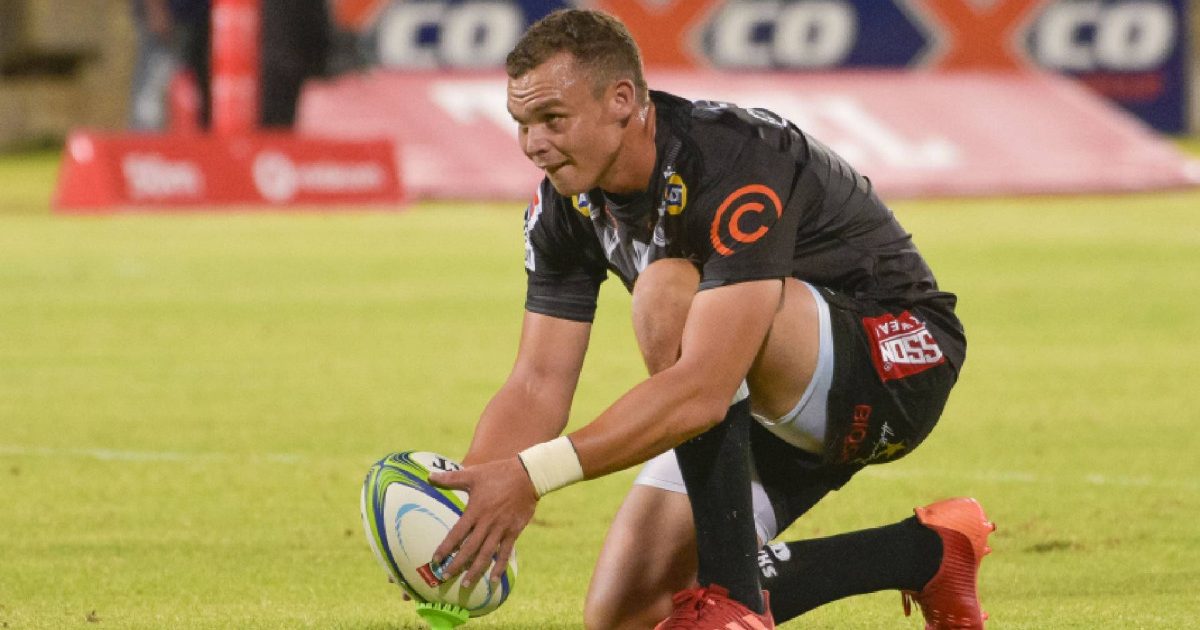Curwin Bosch lands last-minute penalty to snatch dramatic Super Rugby Unlocked victory for Sharks

Curwin Bosch landed an injury-time penalty from 40 metres out to sneak a one-point win for the Sharks over Griquas in Kimberley on Friday.
The 34-33 win keeps alive the Durban side’s chances of winning the title in what is becoming a tournament heavily influenced by COVID-19-influenced cancelled matches.
For 80 minutes Griquas threw everything at the Sharks and with time up looked likely to record their first win of the season.
However, Griquas – who had to replace their captain and flyhalf George Whitehead (who fracture his hand in the captain’s run on Thursday) – were very poor from restarts.
It was from one of those restart shockers that they coughed up the possession that allowed the Sharks to steal victory.
The first real scoring opportunity came when the Sharks went offside just outside their own 22 and Tinus de Beer made it 3-0 for the home team.
The Sharks hit back with the first try five minutes later – a turnover by Thembelani Bholi inside his own 22 and a quick counter that exposed Griquas’ compromised defence. Scrumhalf Sanele Nohamba finished the sweeping move and Curwin Bosch added the conversion – 7-3.
That was followed by a line-out penalty to Griquas towards the end of the first quarter, which De Beer slotted to narrow the gap to 6-7, and then regained the lead for his team (9-7) with his third penalty in the 27th minute.
That’s how it stayed till the half-time break.
The second half started with a scrum penalty top the Sharks, which Curwin Bosch slotted to reclaim the lead – 10-9.
CANCELLED: The virus strikes again. https://t.co/nLAarhuKsA
— RugbyPass (@RugbyPass) November 13, 2020
That didn’t last long. Through a series of phases, Griquas worked their way into the Sharks 22 and eventually Ederies Arendse went over for a home-team try. De Beer made it a 16-10 game with the conversion.
Just past the 50-minute mark a powerful scrum by Griquas opened a gap down the blindside and allowed wing Eduan Keyter to break through a couple of weak tackles and sprint over for the home team’s second try. De Beer made it 23-10 with the conversion.
Another restart mistake by Griquas – and there were several – allowed the Sharks to pounce on a ball close to the Griquas line. The TMO ruling ruled out the try.
However, the Sharks had a scrum feed five metres from the home team’s line. The scrum was all over the place, but the Sharks managed to get the ball out to replacement Manie Libbok, who went over in the right corner. Bosch narrowed the gap to 17-23 with the conversion.
The Griquas response was immediate – a line-out turnover resulted in flank Gideon van der Merwe sprinting over for the third try. De Beer made it 30-17 with the conversion.
Another poor restart from Griquas allowed the Sharks possession inside the home team’s 22. A series of phases saw Jeremy Ward finish off the third try for the visitors. Bosch made it a six-point game (24-30) with the conversion.
That was followed by a sweeping move from deep inside the Sharks half, finished off by Dylan Richardson. Bosch reclaimed the lead (31-30) with the conversion.
With 10 minutes remaining Bosch had a shot from well inside his own half, but just pushed it wide.
One minute from time the Sharks were penalised for a line-out maul infringement and from 40 metres, on the angle, De Beer slotted the kick to reclaim the lead – 33-31.
From the restart, the Sharks were awarded a breakdown penalty and from 40 metres out Bosch slotted the winning kick – 34-33.
Sharks 34 (Tries to Sanele Nohamba, Manie Libbok, Jeremy Ward, Dylan Richardson; four conversions and two penalties to Curwin Bosch)
Griquas 33 (Tries to Ederies Arendse, Eduan Keyter, Gideon van der Merwe; three conversions and four penalties to Tinus de Beer)
– Rugby365











































































